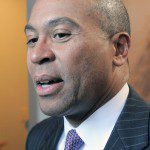STEVE LeBLANC, Associated Press
BOSTON (AP) — Gov. Deval Patrick is pushing legislation to give cities and towns more control over the number of liquor licenses in their communities.
Lawmakers passed a bill last fall allowing the town of Norfolk to grant a liquor license to a local food mart. The measure was one of at least 18 bills the Legislature approved last year allowing communities from Fairhaven to Fitchburg to grant an additional liquor license to a specific business.
Patrick and others say that while doling out individual liquor licenses has become commonplace on Beacon Hill, it’s also cumbersome for local cities and towns trying to build their economies.
“What we are saying is you ought not to have to come — if you’re Lowell or any other city or town — to the Statehouse and get legislation passed to get one more liquor license,” Patrick said recently on his monthly radio show on WGBH-FM. “That decision ought to be made locally.”
Under current state law, the cap on the number of licenses allowed in a city or town is set by a formula based partly on a community’s population numbers. To go above the cap requires the Legislature to pass a separate piece of legislation for each additional license.
Patrick’s bill would remove the cap, eliminating the Legislature from stepping in.
Testifying at a Statehouse hearing Thursday, Secretary of Administration and Finance Glen Shor argued that the change also would be a boon to the state economy by streamlining the licensing process and giving local communities more control.
“We have heard from developers who cannot start construction because lenders are refusing to finance projects until they know the project will have an adequate number of liquor licenses in place,” Shor said.
House Speaker Robert DeLeo and Senate President Therese Murray haven’t yet said whether they support the legislation. Although requests for additional licenses are vetted by legislative committees, typically little or no debate takes place before they are approved by the full House and Senate.
Many mayors and town leaders embrace the proposal, saying it would strengthen local municipalities by removing one more bureaucratic hurdle to their growth. Supporters argue that capping licenses makes it harder for new businesses in depressed urban areas to take off.
Not veryone likes Patrick’s proposal. Among the skeptics are some liquor license holders since a flood of additional licenses could threaten their businesses.
Massachusetts Restaurant Association President Bob Luz said that while restaurants are generally supportive of increasing license availability and expediting the process, he remains concerned about the effect that would have on existing owners “who may have paid a far steeper price due to current market restrictions.”
Those licenses can be worth hundreds of thousands of dollars in cities like Boston.
“We hope that any legislation that moves forward would explore options that will close the delta between the need for new licenses and the business model of the existing license system,” Luz said in a statement.
For Patrick, removing the cap on liquor licenses is part of what he sees as a wider effort to spur development and add jobs.
“If we are really serious about growing opportunity and accomplishing that by growing the economy, then we’ve just got to make it simpler to make their investment decisions and get on with it,” he said.


